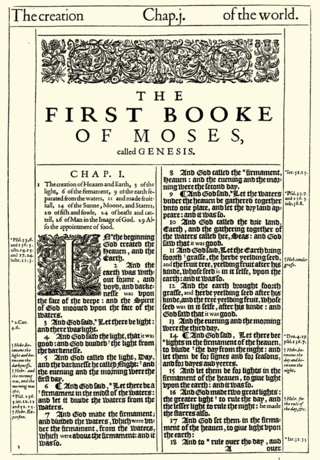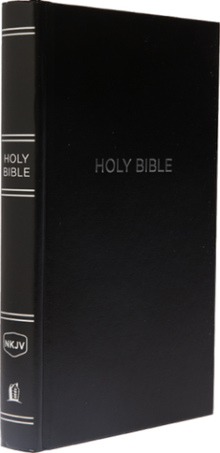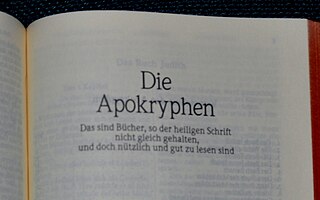
The King James Version (KJV), also the King James Bible (KJB) and the Authorized Version (AV), is an Early Modern English translation of the Christian Bible for the Church of England, which was commissioned in 1604 and published in 1611, by sponsorship of King James VI and I. The 80 books of the King James Version include 39 books of the Old Testament, 14 books of Apocrypha, and the 27 books of the New Testament.
Jah or Yah is a short form of the tetragrammaton יהוה (YHWH), the personal name of God: Yahweh, which the ancient Israelites used. The conventional Christian English pronunciation of Jah is, even though the letter J here transliterates the palatal approximant. The spelling Yah is designed to make the pronunciation explicit in an English-language context, especially for Christians who may not use Hebrew regularly during prayer and study.

The Geneva Bible is one of the most historically significant translations of the Bible into English, preceding the Douay Rheims Bible by 22 years, and the King James Version by 51 years. It was the primary Bible of 16th-century English Protestantism and was used by William Shakespeare, Oliver Cromwell, John Knox, John Donne and others. It was one of the Bibles taken to America on the Mayflower, and its frontispiece inspired Benjamin Franklin's design for the first Great Seal of the United States.

The Revised Version (RV) or English Revised Version (ERV) of the Bible is a late-19th-century British revision of the King James Version. It was the first officially authorised and recognised revision of the King James Version in Great Britain. The work was entrusted to over 50 scholars from various denominations in Great Britain. American scholars were invited to co-operate, by correspondence. Its New Testament was published in 1881, its Old Testament in 1885, and its Apocrypha in 1894. The best known of the translation committee members were Brooke Foss Westcott and Fenton John Anthony Hort; their fiercest critics of that period were John William Burgon, George Washington Moon, and George Saintsbury.

The King James Only movement asserts the belief that the King James Version (KJV) of the Bible is superior to all other English translations of the Bible. Adherents of the King James Only movement, mostly members of certain Conservative Anabaptist, traditionalist Anglo-Catholic, Conservative Holiness Methodist and Independent Baptist churches, believe that the King James Version has been providentially preserved to be a perfect translation of the Bible into English, and they also generally believe that all other English translations of the Bible which were published after the KJV was published to be corrupt.
Partial Bible translations into languages of the English people can be traced back to the late 7th century, including translations into Old and Middle English. More than 100 complete translations into English have been produced. A number of translations have been prepared of parts of the Bible, some deliberately limited to certain books and some projects that have been abandoned before the planned completion.

The Douay–Rheims Bible, also known as the Douay–Rheims Version, Rheims–Douai Bible or Douai Bible, and abbreviated as D–R, DRB, and DRV, is a translation of the Bible from the Latin Vulgate into English made by members of the English College, Douai, in the service of the Catholic Church. The New Testament portion was published in Reims, France, in 1582, in one volume with extensive commentary and notes. The Old Testament portion was published in two volumes twenty-seven years later in 1609 and 1610 by the University of Douai. The first volume, covering Genesis to Job, was published in 1609; the second, covering the Book of Psalms to 2 Maccabees plus the three apocryphal books of the Vulgate appendix following the Old Testament, was published in 1610. Marginal notes took up the bulk of the volumes and offered insights on issues of translation, and on the Hebrew and Greek source texts of the Vulgate.
Early Modern English Bible translations are those translations of the Bible which were made between about 1500 and 1800, the period of Early Modern English. This was the first major period of Bible translation into the English language including the King James Version and Douai Bibles. The Reformation and Counter-Reformation led to the need for Bibles in the vernacular with competing groups each producing their own versions.

The New King James Version (NKJV) is a translation of the Bible in contemporary English. Published by Thomas Nelson, the complete NKJV was released in 1982. With regard to its textual basis, the NKJV relies on a modern critical edition for the Old Testament, while opting to use the Textus Receptus for the New Testament.

Modern English Bible translations consists of English Bible translations developed and published throughout the late modern period to the present.

The Life Application Study Bible is a Study Bible published by both Tyndale House and Zondervan Publishers. It features extensive notes, book introductions, character studies, articles, commentary, maps and charts. It is available in multiple translations, in both English and Spanish, and is advertised as "today's number one selling study Bible".
There have been various debates concerning the proper family of biblical manuscripts and translation techniques that should be used to translate the Bible into other languages. Biblical translation has been employed since the first translations were made from the Hebrew Bible into Greek and Aramaic. Until the Late Middle Ages, the Western Church used the Latin Vulgate almost entirely while the Eastern Church, centered in Constantinople, mostly used the Greek Byzantine text. Beginning in the 14th century, there have been increasing numbers of vernacular translations into various languages. With the development of modern printing techniques, these increased enormously.
Robert Tighe was an English cleric and linguist born in Deeping, Lincolnshire, in 1562. He received his education from Trinity College, Cambridge and Magdalen College, Oxford.
Robert Spaulding was an English scholar, Fellow of St John's College, Cambridge and one of the translators, in the "First Cambridge Company", of the King James Version of the Bible. The company translated from 1 Chronicles to the Song of Solomon. He succeeded Edward Lively as Regius Professor of Hebrew at Cambridge.
Andrew Bing (1574–1652) was an English scholar. He was a fellow of Peterhouse, Cambridge, and succeeded Geoffrey King as Regius Professor of Hebrew at Cambridge. He served on the "First Cambridge Company" charged by James I of England with translating parts of the Old Testament for the King James Version of the Bible.
Richard Kilby (Kilbye) (1560–1620) was an English scholar and priest.

William Branthwaite (1563–1619) was an English scholar and translator.

Jehovah is a Latinization of the Hebrew יְהֹוָהYəhōwā, one vocalization of the Tetragrammaton יהוה (YHWH), the proper name of the God of Israel in the Hebrew Bible/Old Testament. The Tetragrammaton יהוה is considered one of the seven names of God in Judaism and a form of God's name in Christianity.

The biblical apocrypha denotes the collection of apocryphal ancient books thought to have been written some time between 200 BC and 100 AD.

The LDS edition of the Bible is a version of the Bible published by the Church of Jesus Christ of Latter-day Saints in English, Spanish, and Portuguese. The text of the LDS Church's English-language Bible is the King James Version, its Spanish-language Bible is a revised Reina-Valera translation, and its Portuguese-language edition is based on the Almeida translation. The editions include footnoting, indexing, and summaries that are consistent with the doctrines of the LDS Church and that integrate the Bible with the church's other canonized Latter-day Saint scriptures. The LDS Church encourages its members to use the LDS Church edition of the Bible.












